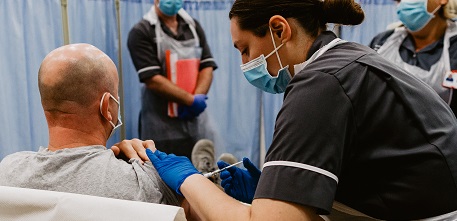The World Health Organisation (WHO) has used data from the COV-Boost trial in its advice on COVID-19 vaccine schedules.
Comparing booster vaccines
COV-Boost compared responses to seven COVID-19 vaccines when used as a third jab. A world first, its initial data informed the UK’s autumn 2021 booster roll-out. Now the full results are informing global vaccination efforts through WHO guidance. That guidance draws heavily on the December 2021 paper, published in The Lancet.
The national trial looked at the safety, immune responses and side-effects of the seven vaccines. It ran at 18 sites across the country and was led from Southampton by Prof Saul Faust. It showed all were safe, and that six significantly boosted COVID-19 antibodies after two initial doses of AstraZeneca or Pfizer-BioNTech.
2,878 people aged 30 or over received one of the six boosters 10-12 weeks after their second dose. A control group received meningitis vaccine, to account for reactions not specific to the COVID-19 jabs.
Global impact
The document ‘Interim recommendations for heterologous COVID-19 vaccine schedules’, published on the WHO website, was developed based on advice from UK Government advisory group SAGE.
COV-Boost results feature repeatedly, including as the basis for using lower doses of the Pfizer-BioNTech vaccine. Using lower doses could be key to making supplies go further. That's particularly important for lower- and middle-income countries. A sub-study of COV-Boost is now comparing different doses.
The COV-Boost trial has also informed UK policy. It helped determine which vaccines were used in the booster programme. It also provided information on how safe it is to switch to a three-month gap between the second and third dose. The results were used to inform the public that antibody levels are high by day seven after the third dose.
Prof Saul Faust, trial lead and Director of the NIHR Southampton Clinical Research Facility, said: “This shows the vital role of the UK’s vaccine research globally. Our results have not only underpinned UK booster strategy, but are helping the global effort.”
“We hope that this guidance, and findings from our new sub study, will allow countries worldwide to optimise their approach and make supplies go further.”

Comments